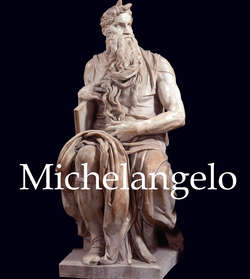Читать книгу Michelangelo - Eugène Müntz - Страница 6
На сайте Литреса книга снята с продажи.
The Medici Factor
ОглавлениеDomenico Ghirlandaio’s workshop catered strictly to affluent Florentines. He had a flair for frescos and his paintings are among the earliest to show a Renaissance influence. He worked on the Sistine Chapel alongside Botticelli, Rosselli and Pinturicchio under the direction of Perugi and served as personal decorator to Lorenzo de Medici.
The Holy Family (Tondo Doni)
c. 1504
Circular wooden panel painted with tempera (watered down), diameter: 120 cm
Galleria degli Uffizi, Florence
In drawing and painting classes at the workshop, Michelangelo’s talent soon set him apart from his Peers. On his own initiative, he did a colour version of a work of Schoen’s. Ghirlandaio soon realized he had a genius on his hands and made him study Giotto, Masaccio and Santo Spirito.
Nude Study for The Battle of Cascina
c. 1504
Quill, 40.8 × 28.4 cm
Casa Buonarotti, Florence
Altogether, Michelangelo spent three years in the atelier copying masters such as Donatello and Jacopo della Quercia, sharpening his eye as he went along. There, he became fully aware of his own visual acuity, analytical mindset and solid feel for colors.
Study for The Battle of Cascina
c. 1504
Black pencil, 28.2 × 20.3 cm
Musée du Louvre, Paris
He also made enemies at the atelier, for many were envious, and his nose bore the mark of a blow by the jealous, violent Torrigiani, to whom we owe the Villa Romana.
Nude Study and Other Studies Probably for the Battle of Cascina
c.1504–1505
Galleria degli Uffizi, Florence
Though he met Lorenzo de Medici through Ghirlandaio, Michelangelo would always deny that his teacher had taught him anything of value or influenced him in any way. Filled with ambition, Michelangelo was sure of his exceptional talent and liked to see it as the sole reason for his success.
Virgin with Child and St John the Baptist as a Child (Tondo Taddei)
1504–1505
Marble, diameter: 106.8 cm
Royal Academy of Arts, London
It was a good era for artists. Lorenzo de Medici, also known as “Il Magnifico”, was a patron of art and literature who, inside his own palace, founded a school chaired by Bertoldo, a student of Donatello’s, then prominent in the Florence art scene.
Virgin with Child and St John the Baptist as a Child (Tondo Pitti)
1504–1505
Marble, 85 × 82.5 cm
Museo del Bargello, Florence
The most promising young artists flocked to study sculpture there. Through that school, Michelangelo met the Medici family and was greatly impressed by their fabulous collection of sculptural works. The school marked a quantum leap in his artistic education and led to a lifelong working relationship with the Medici family.
Конец ознакомительного фрагмента. Купить книгу
